Several of our graduate students are available to connect over email or during an in-person visit to campus. They are excited to discuss their experiences in the program with prospective students. Below, they share more about themselves, their interests and what drew them to the Environmental Studies department.
Masters

Mirabai Collins is co-founder and lead farmer at Black Futures Farm in Portland, Oregon, where she grows vegetables, fruit, flowers, and community. She is also a co-director of the Black Food Sovereignty Coalition and helps to teach and grow food in prisons through the Lettuce Grow program at Growing Gardens. Her interests include Black ecocritical thought, Black ecofeminisms, food systems justice, and the communication of ideas about race and nature in literary and artistic contexts. Her two graduate focal departments are English and Indigenous, Race, and Ethnic Studies (IRES).
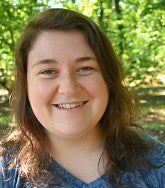
Marissa Lane-Massee grew up as a hazelnut farmer in Keizer, OR. She graduated from the University of Oregon in 2020 and spent two seasons working as a botany/habitat restoration technician for the U.S. Forest Service and U.S. Fish and Wildlife Service. Inspired to bridge conservation and agricultural practices, her project focuses on native plant cover cropping in hazelnut orchards. Learning from her two focal areas of biology and landscape architecture, she hopes to implement cover cropping and other sustainable approaches to improve ecosystem services in orchards, connect fragmented habitats, and conserve Willamette Valley biodiversity.
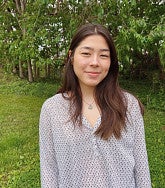
Hana Matsumoto is a M.S. student in the Department of Environmental Studies and a National Science Foundation Graduate Research Fellow. She earned her B.S. from Kent State University in Environmental and Conservation Biology and minored in GIS. After graduation, she continued working in the Assal Biogeography and Landscape Dynamics Lab at Kent State as a research assistant. There, Hana worked on a variety of spatial ecology projects focused on ecosystem disturbance. Her current research interests include understanding the effects ecosystem disturbances, such as fire and climate change, have on ecological processes in terrestrial landscapes using geospatial techniques.

Dhruv Modi: A graduate from the University of Chicago with a degree in Ecology and Evolution, Dhruv’s interests lie on the borderline between science and politics. He has worked in conservation research studying big cats for the World Wildlife Fund in India and endangered sage grouse in Montana. . Although he is yet to finalize a research topic, Dhruv wants to investigate the expanding space of political ecology with a focus on environmental decision making in democratic political institutions. To this end, he is looking for opportunities to study and write about the relationship between climate policy and scientific research.
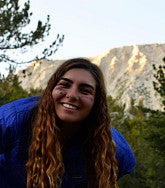
Helena Virga is a master's student pursuing concurrent degrees in Environmental Studies and Nonprofit Management. Her focus areas are climate change advocacy, environmental education, and equitable and accessible youth outdoor recreation. Helena has worked for nonprofits in many fields from youth homelessness to outdoor recreation, and enjoys helping organizations expand their internal capacity. Helena serves on the board of directors of the McKenzie River Trust supporting river and community conservation. Helena also works for Firefighters United for Safety, Ethics and Ecology (FUSEE) and Oregon Wild doing fire and climate change advocacy.
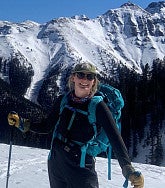
Ellie Wood: Before coming to UO, Ellie worked as a water resource engineer modeling rivers and designing storm systems. Ellie’s general research interests include making small businesses and their surrounding communities more environmentally friendly through the use of urban planning, green-building design, and renewable energy. In the past, she has specifically researched the sustainability of a microbrewery and explored the viability of sustainable technologies in rural Guatemalan communities. Ellie hopes to further her education at UO while focusing on sustainable design in the built environment and the way in which we can retrofit today's urban infrastructure.
PHD's
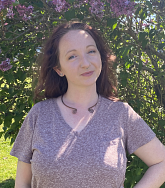
Kristina Beggen is called to research the entangled, complex, and often fraught relationships between human beings and the more-than-human world. She is particularly drawn to wolves and as they return to lands they had been eliminated from, such as the Pacific Northwest. With Sociology as her focal department, she seeks to explore the underlying worldviews and values that shape human and wolf interactions and ultimately inform more comprehensive and just wildlife policy. Prior to undergoing her Ph.D., Kristina organized for the Stand Up to Factory Farms coalition and has a background in agroecology.
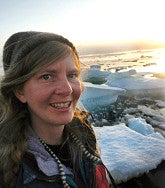
Ori Chafe’s research interests bridge the fields of pyrogeography and climate change ecology. Her master’s thesis (UO ENVS ’20) focused on the impacts of warming-driven landscape disturbances on shrub expansion in the Alaskan Arctic. Her dissertation examines the factors affecting the successional trajectories of post-fire ecosystems in western North America. Ori is a National Science Foundation Graduate Research Fellowship (NSF GRFP) recipient and has over a decade of research experience spanning alpine, coastal, riparian, and tundra ecosystems. Prior to her graduate studies, Ori conducted research for Lawrence Berkeley National Laboratory, the University of California Natural Reserve System, and Sierra Streams Institute.
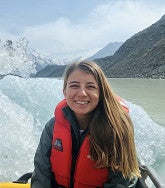
Dara Craig's research promotes living oceans and climate justice, with focuses on joint marine spatial planning, fisheries co-governance, and supporting Tribal self-determination. She is gratefully a member of the Glacier Lab, and she also works with the Tribal Climate Change Project through the PNW Just Futures Initiative. Prior to graduate school, Dara worked as a teaching assistant for an earth systems field camp in Aotearoa, a scientific diver for a coral restoration initiative in Indonesia, and a director of a marine science and sailing program in the BVI.
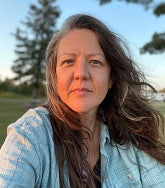
Lisa Fink (Focal Department: English) studies human-nature and human-animal interaction alongside U.S. racial formation, settler colonialism, and imperialism. Their dissertation, “Unsettled Ecologies: Alienated Species, Indigenous Restoration, and U.S. Empire in a Time of Climate Chaos,” explores relationships between environmental conservation discourses of species invasion, Indigenous resurgence, and the racialization of immigrants in the U.S. It includes a digital public humanities project, “Atlas of Alienated Species,” that analyzes the political and cultural ecologies of alienated species around Turtle Island. Their article “‘Sing the Bones Home’: Material Memory and the Project of Freedom in M. NourbeSe Philip’s Zong!” was published in Humanities in 2020.

Madison Fowler-Niblock: Before UO, Madison attended Northern Arizona University for her M.A. in Literature, where she studied eco-eroticism in novels by Indigenous authors. As a student in the ESSP program, Madison’s research interests are a continuation of her prior study on eco-eroticism, with special attention to the National Park Service as an extension of the American colonial project. Madison is also interested in the settler Christianization of parklands and its lasting impact on the reciprocal relationship between the human and more-than-human.
Alexa Foor
Alexa Foor: Before entering the ESSP program in 2018, Alexa lived and worked in Michigan as a student in English at Saginaw Valley State University. Their research interests are at the intersection of queer and trans theory and environmental studies, focusing primarily on climate change, temporality, and queer futures. They are an English focal student and are affiliated with the Women's, Gender, and Sexuality Studies department at UO as well. With their dissertation work they hope to focus on queer and trans communities and how those communities experience euphoria, even when the future is uncertain.
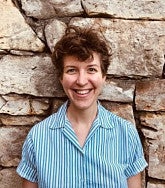
Sophia Ford is a PhD candidate in Environmental Studies and the Department of Geography with a research focus on political geography, white supremacy, and cultural memory. Their dissertation project examines right-wing contestations to cultural memory in the Midwest. Sophia’s upbringing in rural Kansas amongst oil wells, irrigation systems, and changing landscapes of the Great Plains were formative in shaping their research and interests. Sophia has a BS in geology and an MS in Environmental Policy. Outside of research, Sophia enjoys ceramics, painting, and gardening. https://criticalracelab.uoregon.edu/
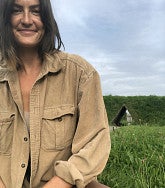
Megan Hayes’s research is situated between feminist science studies, the blue humanities, and artistic research—fields of interest informed by undergraduate studies in Photography and Situated Media at the University of Technology, Sydney, and a Research Master's in Cultural Analysis from the University of Amsterdam. Megan’s PhD project explores the cultural lives of ocean acidification, tracking multiple, multispecies means by which the ocean’s chemistry is sensed and made sense of. She is most often preoccupied with thoughts of oysters, rocks, and other bodies; ecological attunements and their histories; proximity to water; and forms of low-carbon pleasure.
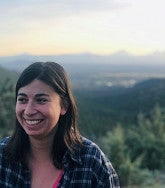
Meredith Jacobson: Motivated by her experience working in forestry, Meredith came to ENVS and Sociology to gain a deeper understanding of the cultural politics of land management. As a non-Native scholar, she is interested in how non-Tribal governments and NGOs are partnering with Tribal nations to address wildfire challenges, and how these partnerships perpetuate versus disrupt settler colonial power. She has worked on applied social science research with the Ecosystem Workforce Program, the Tribal Climate Change Project, the Watershed Research and Training Center, and the Karuk Tribe.
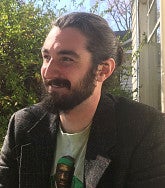
Kyle Keeler: A former high school teacher and basketball coach from Ohio, Kyle completed his Master’s at Kent State University before coming to UO. His work focuses on Native American Studies, Indigenous Studies, and literature, and it has appeared in Environment and Planning E: Nature and Space, Ethics, Policy, & Environment, ISLE: Interdisciplinary Studies in Literature and Environment, Early American Literature, and elsewhere. His dissertation, Land Acts: Land’s Agency in American Literature, Law, and History studies how land’s agency is represented in, and influences, texts from the Early Colonial Period to the Progressive Era in order to reanimate land across American history.
Bjorn Kristensen
Bjørn Kristensen is an environmental philosopher working at the intersection of animal ethics, environmental justice, and public health. One emphasis of his research is considering ethical implications involving animals who have developed beneficial dependencies on humans and anthropogenic environments–For example, threatened species living in urban settings such as the critically endangered European hamster in Vienna, Austria (a case he has written on). His recent research focuses on interspecies considerations of zoonotic disease, and sanitation justice. He has a chapter in an upcoming volume on the One Health approach, and his work has been published by the European Society for Agricultural and Food Ethics, and in Environmental Ethics and the Journal of Holy Land and Palestine Studies.
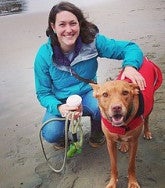
Katrina Maggiulli is a PhD Candidate in Environmental Sciences, Studies, and Policy with a focal department in English. Anchored in her prior field work as an environmental educator for the U.S. Fish & Wildlife Service and various non-profits, her research focuses on the ethical dimensions of conservation policy, practice, and education. Her dissertation, Managing Life’s Future: Species Essentialism and Evolutionary Normativity in Conservation Policy, Practice, and Imaginaries, explores the materiality of popular species concepts as they are operationalized through the U.S. Endangered Species Act, thereby making certain species futures possible while preventing others. She also incorporates artistic methods into her work, and her dissertation is accompanied by a Speculative Field Notes on the Pacific Northwest project.
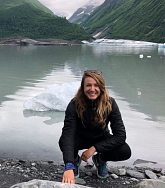
Holly Moulton is a PhD candidate in Environmental Sciences, Studies, and Policy. Her research focuses on Quechua women’s lived experiences of climate change adaptation and processes of futuremaking in the glaciated Peruvian Cordillera Blanca. She is also interested in how race and gender are represented by diverse actors in national climate change adaptation policies and policymaking in Peru and other icy regions of the globe. Both her teaching and research revolve around a deep commitment to intersectional environmental and social justice.
Zac Provant
Zac Provant studies how mountain communities experience changing snow in the Pacific Northwest, and his dissertation research focuses on the growing risks of urban avalanches and landslides in Juneau, Alaska. Zac examines how people frame, manage, and experience these growing winter hazards, as well as how avalanche and landslide mitigation can be woven into climate change adaptation efforts. In his free time, you’ll find Zac in the Cascades—biking, running, and backcountry skiing with his border collie.
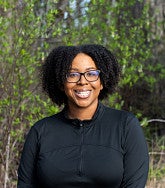
Maya Revell is a doctoral student in Environmental Studies with a concentration in Critical and Sociocultural Studies in Education. She received her BA in Biology and MA in Sustainability from Wake Forest University with experience in environmental education and grantmaking. Her research is focuses on disrupting antiblackness in environmental education and exploring how decolonial perspectives and critical frameworks like Black Feminist Ecologies can enhance the transformative potential of environmental education. Maya is a Westling Environmental Justice Fellow through the Just Futures Institute and a member of the 2022 Environmental Fellows Program at the Yale School of the Environment.

